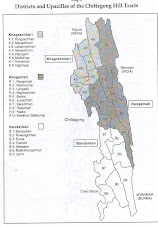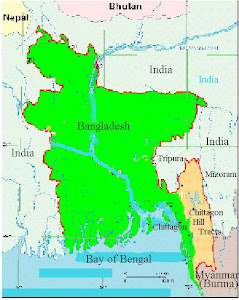Source- http://www.thaindian.com/newsportal/world-news/court-begin-work-in-bangladeshs-chittagong-hill-tracts_10066379.html
Dhaka, July 1 (IANS) Courts began functioning Tuesday in the three districts of Chittagong Hill Tracts, Bangladesh’s non-Muslim indigenous majority region, de-linking the judiciary’s work from the Chittagong port city. According to a notification issued by the government June 29, Mohammed Dudu Mia, Mohammed Mokhtar Hossain and Mohammed Golum Maola have been appointed as the three district and sessions judges for Rangamati, Khagrachhari and Bandarban, respectively.
They were directed to join their new offices Tuesday morning, The Daily Star said.
The region comprises an area of 13,180 square kilometres in south-eastern Bangladesh, and borders India and Myanmar.
It was a single district of Bangladesh till 1984 when it was divided into three separate districts: Khagrachari, Rangamati and Bandarban.
Topographically, this is the only hill-intensive area of Bangladesh.
According to the 1991 census, the population of the area was 974,447 of which 501,114 were tribals and the rest were from different communities. The indigenous people are collectively known as the Jumma, who profess Buddhism.
CHT went to East Pakistan under the Radcliff Award that divided India in 1947 on the ground that Pakistan needed to retain river Karnaphuli, the water source of Chittagong port.
It was not contested by India, past records say.
During the 1970s and 80s, there were attempts by the Government to resettle the area with Bengali-speaking people. These attempts were resisted by the tribals, who formed a guerrilla force called the Shanti Bahini.
The Bangladesh military and settlers have been accused of committing genocide against the minority tribal people with silent support from the law enforcers.
The military personnel have been accused of torture, killings and abduction. Amongst these, the disappearance of Chakma political activist Kalpana Chakma in 1996 attracted widespread condemnation.
She remains untraced.
Following years of unrest, an agreement was reached between the Government of Bangladesh and the tribal leaders granting limited autonomy to the elected council of the three hill districts.
The 1997 Peace Treaty signed between the then Sheikh Hasina Government and the Jana Shanghati Shamiti or Shanti Bahini has, however, been opposed by the opposition parties as well as a fraction of the tribal rebels.
Opposition parties of the time argued the autonomy granted in the treaty ignored the Bengali settlers.
skip to main |
skip to sidebar


Map of Bangladesh

CHTs is number one Milliary zone in the world


Ministry of Chittagong Hill Tracts Affairs
The United Nation
The IJPMNA
This page provides information of the minority Indigenous Jumma Peoples in Chittagong Hill Tracts (CHTs) Bangladesh.
Contact with this please write:-ijpnusa@yahoo.com
Contact with this please write:-ijpnusa@yahoo.com
About Us
Location of Jummaland

Jumma Videos
- The BANDARBAN SADAR
- The Rowangchari
- The Ruma
- The Lama
- The Thanchi
- The Alikadom
- The Naikhkhongchari
- The RANGAMATI SADAR
- The Baghaichari
- The Langudu
- The Nanyachar
- The Barkal
- The Jurachari
- The Bilaichari
- The Kaptai
- The Rajsthali
- The Kawkhali
- The KHAGRACHARI SADAR
- The Manikchari
- The Laksmichari
- The Mahalchari
- The Matiranga
- The Ramgarh
- The Dighinala
- The Panchari
Audio & Video
Jumma Natok (Drama)
International Support
Educational Institution
Religious Organization
Buddhist Studies

Map of Bangladesh
Mission of Bangladesh
About Bangladesh
Bangali Audio Songs
Bengali News

CHTs is number one Milliary zone in the world
Online Audios
Refugee in Homeland

Jumma Picture

Blog Archive
About Me
- The Indigenous Jumma Peoples Movement in North America
- The Chittagong Hill Tracts (CHT) region comprises three districts: Banderban , Khagrachari and Rangamati. The districts comprise seven main valleys formed by the Feni, Karnafuli, Chengi, Myani, Kassalong, Sangu and Matamuhuri rivers aid their tributaries and numerous hills, ravines and cliffs covered with dense vegetation, which are in complete contrast to most other districts of Bangladesh, which consist mainly of alluvial lands. Geographically the CHT can be divided into two broad ecological zones: (a) hill valley, (b) agricultural plains. It is surrounded by the Indian states of Tripura on the north and Mizoram on the east, Myanmar on the south and east and Chittagong district on the west.
